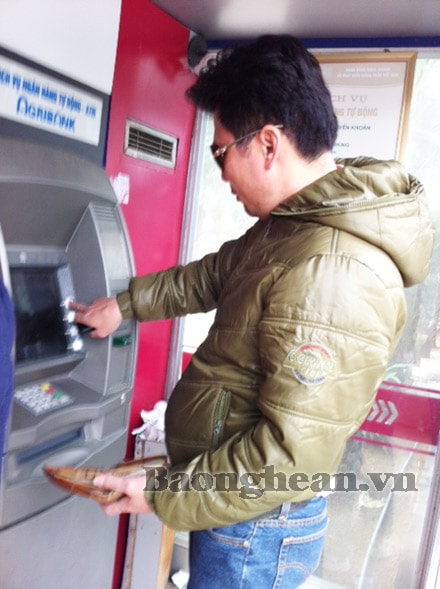ATM transaction fees: Need to be carefully calculated
According to the Draft, customers will have to pay for each transaction on ATM, regardless of the transaction value, large or small. In addition, there are many other fees, depending on the customer policy and service of the card type the customer uses. With that information, many customers, especially those with low incomes who are paid via ATM cards, are concerned.
(Baonghean.vn) -According to the Draft, customers will have to pay for each transaction on ATM, regardless of the transaction value, large or small. In addition, there are many other fees, depending on the customer policy and service of the card type the customer uses. With that information, many customers, especially those with low incomes who are paid via ATM cards, are concerned.
The collection of ATM transaction fees within the network is not a new issue, but has been proposed by banks many times before. Most recently, in April 2012, it met with resistance and disagreement from many card users and was not approved by the State Bank. For this Draft, in 2013, the fee for withdrawing money within the network at ATMs was from 0 - 1,000 VND/transaction, and the maximum for withdrawing money outside the network was 3,000 VND/transaction. By 2015, the withdrawal fee was 3,000 VND/transaction. Customers transferring money will have to pay a maximum fee of 15,000 VND/transaction. In addition, the bank plans to charge card issuance fees ranging from 0 to 100,000 VND/card, annual fees of up to 60,000 VND/card/year, account statement printing fees ranging from 100 to 800 VND/time, account information inquiry fees (without printing documents) at ATMs up to 500 VND/time (only collects off-network transactions). Thus, to use ATM card services, cardholders will have to pay about 7 to 8 different types of fees.
Regarding the issue of bank fees, we had the opportunity to talk with a number of workers, civil servants and leaders of the State Bank. Ms. Pham Thi Chuyen, a worker at Trung Lai Gas Lighter Company, shared: "Our income is only about 2-4 million VND. When we have money, we scrimp and withdraw a few hundred to ensure our monthly expenses. When withdrawing money, to avoid charging off-network fees, we also choose domestic ATMs for transactions. If the bank charges a fee, even a few thousand, it will affect the already difficult lives of workers. If we charge on-network fees, we will only be able to withdraw once, even though we know it will be difficult to balance our expenses."
People wonder: if domestic ATM fees are collected, will service quality increase?
Ms. Giang - teacher of Trang Son Secondary School - Do Luong wondered: In the current difficult context, collecting fees is not appropriate and the collection level is still high in my opinion. We think that when collecting fees, banks need to ensure that the service quality is better and the bank must increase the withdrawal limit. That is, if a customer withdraws at least 5 million VND at a time, the bank will charge a fee to avoid the case of charging a fee for any withdrawal transaction to avoid overcharging.
Currently, banks are racing to expand their market share using ATM cards. Therefore, ATM card services have reached many users. In our province, there are currently 1,077 units paying salaries through accounts and thousands of ATM cards are used. Paying salaries through accounts is considered to have many advantages, although it is slow to deploy but inevitable in Vietnam, it is a measure implemented in efforts to reduce dependence on cash. In addition, for businesses, paying salaries through ATM cards saves human resources, time, and costs in paying salaries to workers. The salary recipient also does not have to waste time, the money is kept safe, and only withdraws when needed. However, with this draft, some customers said: When making a card, the bank has collected an issuance fee, then regulated the remaining money in the card... If the internal transaction fee is collected, we will go directly to the bank to withdraw money, and make transactions when needed. Or, during use, there are many problems such as the machine swallowing the card, deducting the wrong amount after a transaction, freezing the machine, running out of money, overloading on holidays... if the ATM charges for the same network, will the service quality increase?
Talking to us, the leader of the State Bank of Vietnam Nghe An branch said that collecting ATM fees is a market rule. However, at first, many banks wanted to expand their card market share so they waived the fee, now they are collecting it, banks cannot serve for free and this is normal. However, from the people's side, many opinions say that in difficult times, non-cash payments still have many shortcomings and lack of synchronization, so collecting fees is not beneficial. Therefore, commercial banks must carefully research and balance to both improve the operations of commercial banks according to market principles and ensure the Government's goal of non-cash payments.
In order to continue developing the Vietnamese card market and move towards an economy where payments are mainly made without cash, in addition to increasing the number of ATMs and increasing fees, attention should be paid to the quality of ATM card services. Only then will people trust and use bank cards can truly achieve the benefits it can bring.
Thu Huyen
